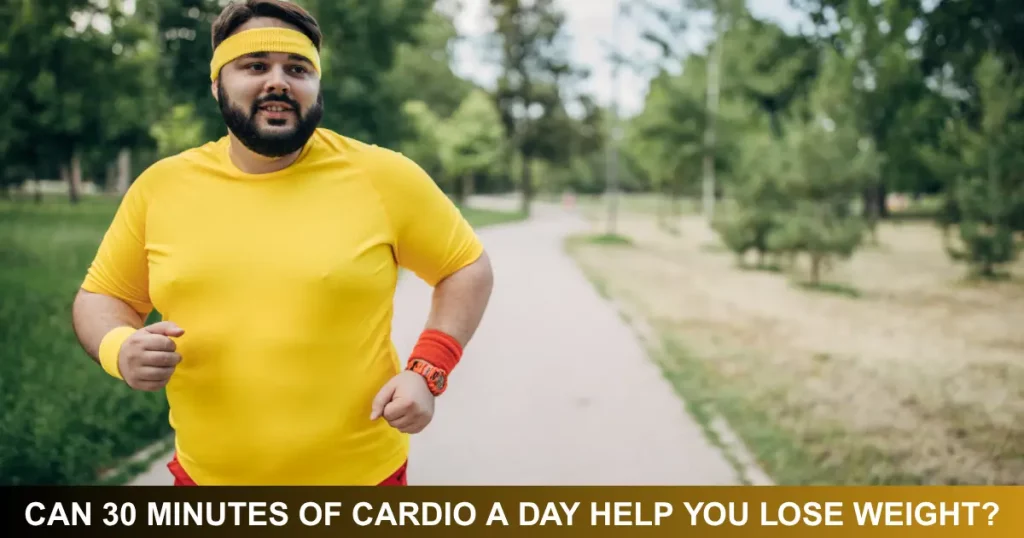If your goal is to lose weight, cardio exercises like running and walking are proven tools to burn calories and boost your heart health. But is simply doing 30 minutes of cardio daily enough to make significant weight loss progress? Let’s break down the science, effective routines, and answer the most pressing questions for your weight loss journey.

What Is Cardio?
Cardiovascular exercise often called “cardio” or aerobic exercise uses oxygen to fuel your workouts and keeps your heart and lungs strong. Whether you’re running, cycling, swimming, or walking, these activities raise your heart rate, help circulate oxygen, and improve overall health. According to leading fitness experts, regular cardio exercise reduces the risk of early death from heart disease and other causes.
While many are drawn to cardio for its heart-healthy benefits, its popularity for weight loss has surged. Cardio activities effectively burn calories and improve your stamina while also building endurance. During cardio, your heart rate should rise above 120 beats per minute, ensuring you’re working hard enough to challenge your body. These exercises also target various muscle groups, from your legs in running and cycling to your upper body in swimming and boxing.
Why Cardio Is Effective for Weight Loss
The key principle behind weight loss is creating a calorie deficit burning more calories than you consume each day. Cardio workouts are a fast and reliable way to contribute to that deficit. When your heart rate rises through sustained aerobic activity, your body demands more fuel. To meet this need, it taps into stored energy: first glycogen (stored sugar) and then fat reserves. Higher-intensity sessions burn more calories and encourage your body to use fat for energy more quickly.
Several factors influence your total weight loss results:
- Intensity: Vigorous workouts burn more calories.
- Age: Older individuals burn fewer calories than younger ones.
- Sex: Men tend to lose weight faster due to higher muscle mass, while women may have higher body fat percentages.
Is 30 Minutes of Cardio Enough for Weight Loss?
Yes, 30 minutes of daily cardio can be highly effective for weight loss if you consistently pair it with a calorie deficit. Research shows that performing cardio for 150 to 300 minutes per week leads to significant reductions in waist circumference, body weight, and overall fat. In practical terms, that’s as simple as doing a half-hour session five days a week.
Even if you prefer shorter sessions, research supports low-intensity cardio daily or high-intensity routines 3–4 times a week as a sustainable way to shed pounds. Consistency and overall activity level are most important. Always be mindful of your body’s signals and take breaks as needed.
Top Cardio Exercises for Weight Loss
Here are some popular and effective aerobic workouts to incorporate into your daily routine:
- Shadow Boxing: Stand in a fighting stance, move side-to-side, and throw combinations of jabs and uppercuts. Perform 3-minute rounds, five times.
- Jump Rope: Stand tall and jump lightly on your toes, rotating the rope with your wrists. Try intervals of 1 minute jumping with 30 seconds rest, repeated multiple times.
- Burpees: Start in a squat, kick your legs back into a pushup, return, and leap into the air. Complete 10–15 reps per set.
- High Knees: Stand with hands up and quickly lift your knees, pumping arms. Perform intervals of 30 seconds active, 30 seconds rest, for up to 10 rounds.
- Mountain Climbers: In a plank position, quickly alternate pulling your knees toward your chest for 20 seconds.
- Squat Jumps: Begin in a squat, explode upward, then land softly and repeat for 15 reps and 4 sets.
- Why Your Mind Wanders During Meditation
- Beginner Yoga Poses for Stress Relief
- Yoga vs Gym: Which is Better for Mental Health?
Important Note
Cardio is a powerful calorie-burner, but diet, sleep, and total daily activity are equally crucial. Overdoing cardio or neglecting strength training can cause muscle loss along with fat, so always aim for a balanced fitness plan tailored to your needs.
FAQs on Cardio and Weight Loss
1. Can 30 minutes of cardio daily really result in weight loss?
Yes, 30 minutes of cardio each day can contribute significantly to weight loss, especially when combined with a balanced diet and lifestyle changes. The key is consistency and creating a calorie deficit.
2. What intensity should my cardio session be for the best results?
For effective fat burning, your heart rate should generally be above 120 beats per minute. Mixing moderate and high-intensity intervals is a great way to maximize calorie burn.
3. Do I have to do the same form of cardio every day?
No. You can mix running, cycling, swimming, or classes to keep workouts interesting and reduce risk of injury. Variety also works different muscle groups for overall fitness.
4. Is it possible to lose muscle from doing only cardio?
Doing excessive cardio without strength training can result in muscle loss as well as fat loss. It’s important to incorporate resistance exercises into your routine for a balanced body composition.
5. Are there any risks to doing cardio every day?
Overtraining may cause fatigue or injury, especially if you don’t allow your body to rest. Listen to your body, take rest days as needed, and consult a fitness professional if new to exercise.
6. How long does it take to see weight loss from daily cardio?
Visible weight loss varies by individual, dependent on starting weight, diet, workout intensity, and consistency. Many people may see changes within a few weeks if they maintain a calorie deficit and regular exercise.
By maintaining 30 minutes of daily cardio activity, managing your calorie intake, and balancing your fitness program with rest and strength training, you can achieve healthy, sustainable weight loss results. Focus on forming habits you enjoy for long-term success.

